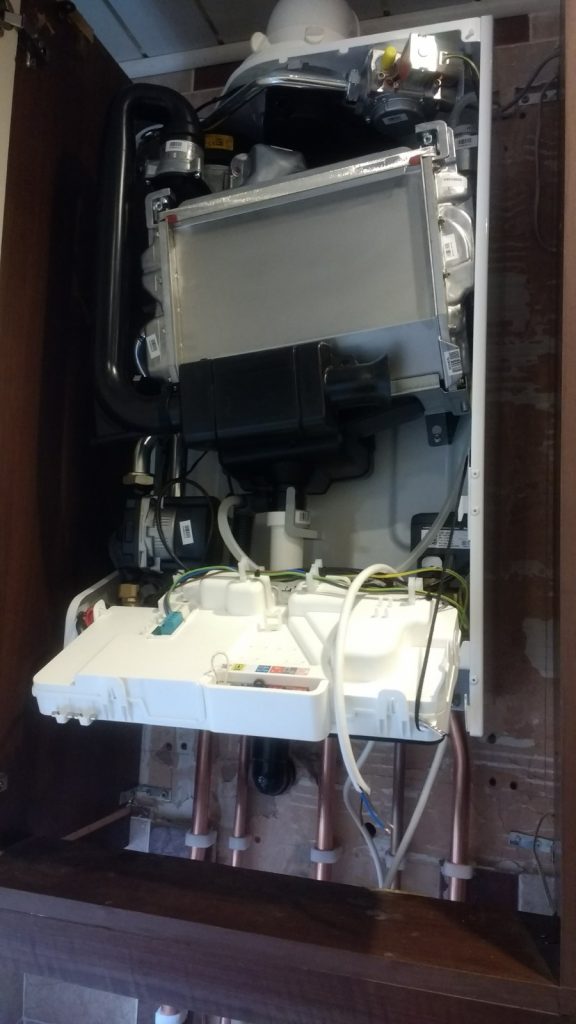If you have an old boiler, it is more important than ever to get a boiler cover plan that gives you peace of mind should it break down, as many people can’t afford the unexpected large expense that a boiler breakdown could cost, as well as the wait to find an engineer to come out and fix it in winter.
Heating plans give you the assurance that a boiler breakdown will be fixed quickly, without the sudden expense, in just one call. But not all cover plans are the same and there are clauses and exclusions to be mindful of when looking at breakdown cover old boilers.

Boiler cover basics
Most new boilers come with at least 3 years warranty and in these early years, you may consider it not worth taking out a cover plan. But as the boiler gets older, the average cost of a repair increases too. Examples include a new fan (£240), pump (£260), PCB (£350), and heat exchanger (£500).
So, if you are thinking of keeping your boiler until it gives up completely, you will have the peace of mind that with a cover plan, a qualified engineer will come out quickly to repair it, and it won’t cost you hundreds to replace faulty parts.
What is included in a boiler cover plan
- Repairs to one boiler in a residential property
- Flue up to a certain length
- Controls that make the boiler work eg. programmer, thermostats etc.
- Repairs to gas supply pipe
- Repairs to radiators, expansion tank, hot water cylinders (depending on type of cover)
General limitations on boiler cover:
- Policy available to homeowners only, not to tenants
- Exclusion period up to 30 days before cover starts
- The heating system must already be in working order before you take out cover
- Not all fuels may be covered. LPG, oil or solid fuel heating systems may not be covered.
- Removal of sludge, rust and debris from heating system.
For a monthly or annual payment, your boiler is covered for repairs including replacement parts and labour. You make one call, and a gas safe registered engineer comes to try and fix the fault within a short time, usually within 24 hours. In most cases, an initial inspection of the boiler is made to check if it can be covered.
Depending on the type of cover you have, it will work in different ways. The following points are something to look out for in policies generally with every boiler cover plan but especially with older boilers – which in some cases mean over 10 years old, and in others over 7 years old.
Limits on cover for older boilers
The following points are relevant to older boilers. Depending on the policy:
Many providers don’t cover boilers over 15 years old.
This is usually the upper limit for most boiler care plans which means you have less choice when looking for cheaper cover.
Higher excess for older boilers
There may be a higher excess to pay if your boiler is old (usually over 10 years). Although some policies have excess already for a lower monthly payment, older boilers may require a higher excess if you need to call out for a repair.
Limit on callouts
There may be a limit on how many times you can call out for a repair within a year which can be relevant for older boilers that tend to incur faults more often.
Won’t replace a broken boiler
Usually, taking out boiler cover means if the repair can’t be done without costing the company too much, they will replace with a new boiler. But most policies won’t replace a boiler over 7 years old if it’s beyond economical repair.
What happens if its beyond repair
Companies can use the beyond economical repair limitations on their policies more frequently on older boilers so even after having a policy in place for some time, you may still need to contribute towards new parts or even replacement boilers.
Harder to find parts for older boilers
Manufacturers are bringing out new models and ranges all the time and some are brought out to specifically replace certain older models. This means it will be harder to source replacement parts for them and could take more time for your boiler to be fixed. Not ideal in winter time.
Your boiler might not be on the approved list
Not all boiler models are included in the insurance company’s approved list. Depending on the company that will repair your boiler, it may decide it isn’t feasible to work on your appliance. But they should make you aware of this before a cover plan is taken out. Older boilers – especially from smaller, lesser-known companies, are less likely to be on the list.
Smaller payment towards the cost of replacement
In cases where the fault cannot be repaired and a new boiler is required, the provider may not replace the boiler entirely but make a payment to you to cover part of this cost. Boilers over 7 years old usually have a smaller amount paid.
Design faults
Older heating systems may have design faults in them which were acceptable when they were installed but, because of new regulations, are not allowed today. So unless you correct these at your own expense, some providers say they won’t be covered if a repair is needed.
More damage following power cuts
They could be prone to faults on electrical components such as PCB’s and display screens more than modern boilers. Although it shouldn’t stop a repair callout, it would count towards any excess payable if you have that type of policy.

If you are looking for that peace of mind, Hometree provides cover for not only your boiler, but for your home too including central heating, plumbing, drains and home electrics all at an affordable monthly or annual cost.
Hometree aim is to take the stress out of boiler servicing and home maintenance with unlimited call-outs and a 24/7 helpline, as well as a no price-hike promise. Click on the banner below to find out more.
If you don’t want boiler cover
If you prefer to get your boiler repaired as a one-off, remember only qualified heating engineers can fix boilers and also install new boilers for you. They are allowed to work on the internal parts of a gas boiler unlike a plumber that isn’t qualified to do so. Both heating engineers and plumbers can install non gas related pipes, fix water leaks and change radiators.
*The information in this article should be used for general guidance only and not as financial or health advice. Full details are on the link in the footer to our disclaimer page. Always discuss your requirements with a competent and suitably qualified professional before undertaking any work.
Affiliate disclosure
Heatology.co are participants in a variety of affiliate schemes which help fund and run this website, visitors who follow our links and purchase a product may earn Heatology.co a commission. The money we make from affiliate marketing costs you nothing but keeps us online, so thank you for your continued support!
